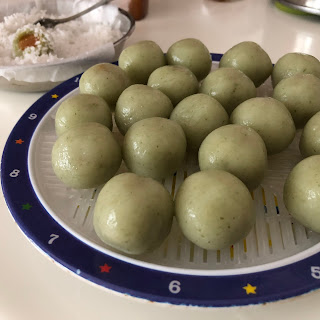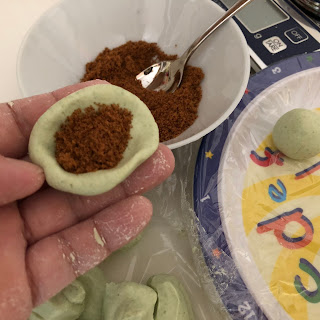Updated on 2 May 2018
Filled with coconut sugar instead of sweet glutinous rice cake. Details at the end.
Yield: 20 balls
Raw dough weight: 278g
Filling
Coating
4. While the dough is resting, place the grated coconut in a plate evenly spread out. Sprinkle some fine salt over and mix well. Place some cut pandan leaf over the grated coconut.
Steam at medium heat for about 10 minutes.
Remove the pandan leaves and transfer the steamed coconut to cooling rack to cool down.
Enjoy 😋
It is best to consume the glutinous rice balls within the same day. Keep the unconsumed ones in a covered container and refrigerate them.
Filling
40~50g coconut sugar/gula melaka granules
Same procedure as above except changing the sweet glutinous rice cake to coconut sugar.
Tips Sharing
1. To store your 年糕 sweet glutinous rice cake longer, keep it in a vacuum pack. It can last for months in room temperature of about 28°to 30°C.
2. Use the remaining coconut to make palm sugar coconut and coconut buns.

Ingredients
10g pandan leaves
70g warm water
140g glutinous rice flour
10g tapiocca starch/glutinous rice flour *
30g hot water
25g warm water (to be added gradually)
Filling
80g 年糕 sweet glutinous rice cake
Coating
100g fresh grated coconut
1 blade pandan leaf
Pinch of fine salt
* if you do not have tapiocca starch, just use glutinous rice flour to replace. The tapiocca starch would make the texture more springy.
Collect about 20g of the sweet glutinous rice cake, and cut into 20 pieces of 1-cm cubes. Set aside.
2. Cut 10g of pandan leaves into thin strips. Add 70g of warm water to the pandan strips and blend into juice using a food processor.
Collect 75 g of the pandan juice and set aside. I did not strain the pandan juice.
3. Mix glutinous rice flour and tapiocca starch in a mixing bowl.
Dig a well in the centre, and pour 30g of hot water into the well.
Let the hot water sit in the well for about 15 seconds.
Mix the hot water with the surrounding flour into crumbs.
Next, pour the 75g of pandan juice from Step 2, and mix well.
Depending on the consistency of the dough, slowly add in the 25g of warm water.
And mix into a pliable dough.
Knead the dough for about 10 minutes into a smooth dough.
Cover with a kitchen towel or food wrap, and let it rest for about 30 minutes. I let the dough rest for about 2 hours ⏳
* if you do not have tapiocca starch, just use glutinous rice flour to replace. The tapiocca starch would make the texture more springy.
Directions
1. Peel away the banana leaves from the sweet glutinous rice cake.2. Cut 10g of pandan leaves into thin strips. Add 70g of warm water to the pandan strips and blend into juice using a food processor.
3. Mix glutinous rice flour and tapiocca starch in a mixing bowl.
4. While the dough is resting, place the grated coconut in a plate evenly spread out. Sprinkle some fine salt over and mix well. Place some cut pandan leaf over the grated coconut.
Add water to the pot and heat up the water to get ready to blanch the glutinous rice balls later.
5. While heating the pot of water, divide the pandan dough into 20 portions, about 14g each.
And rolls into balls.
Flatten the dough ball, and wrap a piece of sweet glutinous rice cube in the centre.
Roll into balls between palms.
6. Bring half a pot of water into a light boil at medium-low heat.
When the water starts to boil,
drop the prepared glutinous rice balls into the boiling water, and stir occasionally to prevent the balls from sticking to the bottom.
After about 10 minutes of "simmering" with lid covered, the glutinous rice balls darkened in the green color, and look translucent on the surface.
5. While heating the pot of water, divide the pandan dough into 20 portions, about 14g each.
Usually the glutinous rice balls of ondeh ondeh will float to the surface when cooked, but maybe due to the weight of the heavier 年糕 filling, the heavier glutinous rice balls did not rise to the surface.
To check whether the glutinous rice balls have been cooked through, take a ball and taste 😌 Haha, to me this is the safest way to determine whether the rice balls are cooked 😊
7. Use a slotted spoon to transfer the rice balls to a steamer rack to dry partially.
Be careful not to let the sticky rice balls stick to each other ❗
Roll the glutinous rice balls over the steamed grated coconut to coat.
Updated on 2 May 2018
Filling
40~50g coconut sugar/gula melaka granules
Same procedure as above except changing the sweet glutinous rice cake to coconut sugar.
Tips Sharing
1. To store your 年糕 sweet glutinous rice cake longer, keep it in a vacuum pack. It can last for months in room temperature of about 28°to 30°C.
2. Use the remaining coconut to make palm sugar coconut and coconut buns.




















































No comments:
Post a Comment
I love seeing your comment and sharing it with other readers. Your comment would be published after moderation. Thank you :)